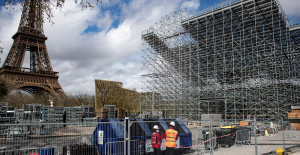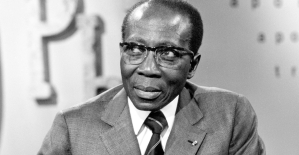In no other German city is the social gap between the districts as wide as in Hamburg, is the social division so tangible - this is roughly the stereotype that is often mentioned in political discussions in connection with the Hanseatic city.
However, a qualitative study by the North Office of the Friedrich-Ebert-Foundation (FES) puts this statement into perspective. For the survey, which was presented on Friday, a series of focused interviews and group discussions were carried out in various parts of the city, but the statements derived from them are not representative of the entire population.
Rather, the SPD-affiliated foundation worked out a picture of the mood, which was then compared with a similar study in Bremen. The conclusion for both cities: "We could not find any hard division processes that potentially endanger peaceful coexistence in diversity and the basic democratic order." speak to your own neighborhood. The respondents are predominantly proud of their cities and would emphasize the tolerant climate.
But some "pain points" were also worked out, and this is where Hamburg and Bremen differ. In Hamburg, the problem of high housing costs was the dominant issue in every conversation, across all of the interviewees' living environments. The desire for more government regulation of the housing market was often mentioned. In Hamburg, increasing "eventing" of the city was also classified as problematic, and there was too much focus on expanding tourism. In addition, questions of personal mobility in the city were critically assessed - this topic even made it to first place in Bremen.
“A comparison of the Hamburg groups surveyed shows that the problem pressure in the inner-city districts is greater than in Bremen for all three issues,” say the study leaders, summing up the differences between the two city-states. Accordingly, political frustration is greater in Hamburg “and the focus on one’s own district as a space for identification – in contrast to the city as a whole – is stronger”.
In both cities, at least among those surveyed, there is hardly any willingness to get involved politically - the expectations of politicians to get more involved in the problem areas mentioned, however, are high. According to the study leaders, “direct political intervention is explicitly desired” in inner-city areas in particular.
And this request is aimed less at top politicians who come by for a moment, but at local politicians on site. If there is "a lack of improvement in people's living conditions", appearances that are perceived as inappropriate could even "promote the frustrated turning away from politics overall". On the other hand, top politicians are welcome in districts of Hamburg that "are more striving for recognition" because they "lead to more self-confidence and the desired increased attention".

 Sudan ravaged by a year of war
Sudan ravaged by a year of war Ten years after the kidnapping of the Chibok girls, what has become of the terrorist group Boko Haram?
Ten years after the kidnapping of the Chibok girls, what has become of the terrorist group Boko Haram? The Israeli government divided on the extent of its response after Iran's direct attack on its territory
The Israeli government divided on the extent of its response after Iran's direct attack on its territory “Is it time for a killing blow?” : the Israeli press wonders about a response after the Iranian attack
“Is it time for a killing blow?” : the Israeli press wonders about a response after the Iranian attack Covid-19: everything you need to know about the new vaccination campaign which is starting
Covid-19: everything you need to know about the new vaccination campaign which is starting The best laptops of the moment boast artificial intelligence
The best laptops of the moment boast artificial intelligence Amazon invests 700 million in robotizing its warehouses in Europe
Amazon invests 700 million in robotizing its warehouses in Europe Inflation rises to 3.2% in March due to gasoline and electricity bills
Inflation rises to 3.2% in March due to gasoline and electricity bills Large French companies are alarmed by the stalling of the European economy
Large French companies are alarmed by the stalling of the European economy New sanctions against Russia send industrial metal prices soaring
New sanctions against Russia send industrial metal prices soaring Olympic Games 2024: civil servants authorized to carry out private security activities
Olympic Games 2024: civil servants authorized to carry out private security activities Threat of strikes for the 2024 Olympics: Macron says he has “confidence” in the “spirit of responsibility” of the unions
Threat of strikes for the 2024 Olympics: Macron says he has “confidence” in the “spirit of responsibility” of the unions Musical show: “Come Bach”, fantasies around the composer
Musical show: “Come Bach”, fantasies around the composer The cry of alarm from Senghor's friends has been heard
The cry of alarm from Senghor's friends has been heard World Chess Championship: Nepomniachtchi and Gukesh lead the candidates tournament
World Chess Championship: Nepomniachtchi and Gukesh lead the candidates tournament Rapper Heuss L’Enfoiré calls on Ronaldinho for his new music video
Rapper Heuss L’Enfoiré calls on Ronaldinho for his new music video Skoda Kodiaq 2024: a 'beast' plug-in hybrid SUV
Skoda Kodiaq 2024: a 'beast' plug-in hybrid SUV Tesla launches a new Model Y with 600 km of autonomy at a "more accessible price"
Tesla launches a new Model Y with 600 km of autonomy at a "more accessible price" The 10 best-selling cars in March 2024 in Spain: sales fall due to Easter
The 10 best-selling cars in March 2024 in Spain: sales fall due to Easter A private jet company buys more than 100 flying cars
A private jet company buys more than 100 flying cars This is how housing prices have changed in Spain in the last decade
This is how housing prices have changed in Spain in the last decade The home mortgage firm drops 10% in January and interest soars to 3.46%
The home mortgage firm drops 10% in January and interest soars to 3.46% The jewel of the Rocío de Nagüeles urbanization: a dream villa in Marbella
The jewel of the Rocío de Nagüeles urbanization: a dream villa in Marbella Rental prices grow by 7.3% in February: where does it go up and where does it go down?
Rental prices grow by 7.3% in February: where does it go up and where does it go down? Europeans: the schedule of debates to follow between now and June 9
Europeans: the schedule of debates to follow between now and June 9 Europeans: “In France, there is a left and there is a right,” assures Bellamy
Europeans: “In France, there is a left and there is a right,” assures Bellamy During the night of the economy, the right points out the budgetary flaws of the macronie
During the night of the economy, the right points out the budgetary flaws of the macronie Europeans: Glucksmann denounces “Emmanuel Macron’s failure” in the face of Bardella’s success
Europeans: Glucksmann denounces “Emmanuel Macron’s failure” in the face of Bardella’s success These French cities that will boycott the World Cup in Qatar
These French cities that will boycott the World Cup in Qatar Augusta Masters: the unchallenged reign of Scottie Scheffler
Augusta Masters: the unchallenged reign of Scottie Scheffler Tennis: Harold Mayot takes Cachin and goes to the second round in Barcelona
Tennis: Harold Mayot takes Cachin and goes to the second round in Barcelona Barça-PSG: “We will do it”, Luis Enrique shows his confidence before the return match
Barça-PSG: “We will do it”, Luis Enrique shows his confidence before the return match Hakimi on Mbappé before Barça-PSG: “I feel very good, very motivated, like the whole team”
Hakimi on Mbappé before Barça-PSG: “I feel very good, very motivated, like the whole team”


















